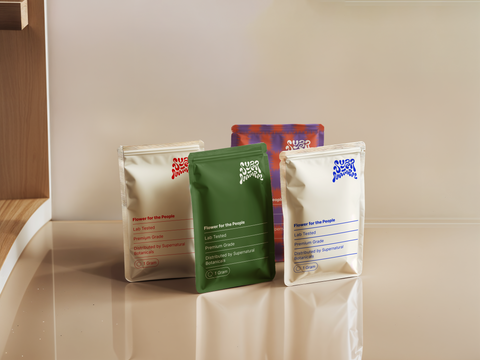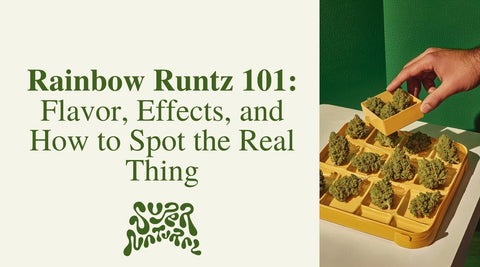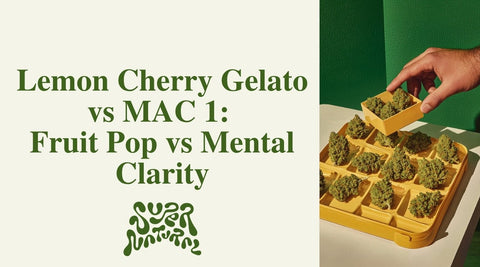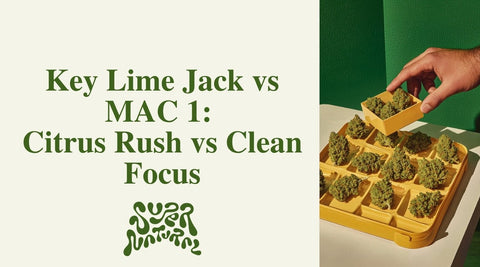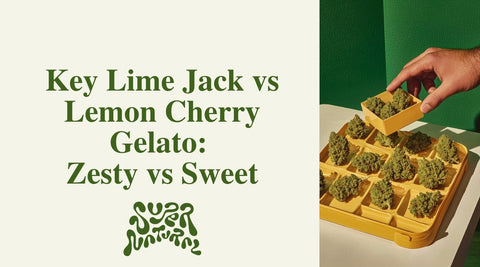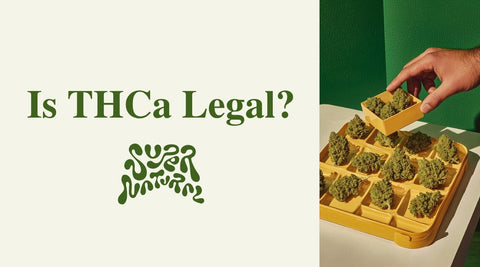
THCa is federally legal in the U.S. if it comes from hemp and contains less than 0.3% Delta-9 THC before decarboxylation. However, several states have banned or restricted it. Legal status varies by state and law enforcement practices.
Yes, THCa Is Legal If You Play By The Rules
THCa flower is legal at the federal level, but only under a very specific set of conditions outlined in the 2018 Farm Bill. That law defines hemp as cannabis with less than 0.3% Delta-9 THC by dry weight before any heat is applied.
THCa falls within that threshold as long as it remains unheated, which is why it qualifies as hemp on paper, even though it produces a traditional cannabis experience when smoked.
For THCa products to meet legal standards:
-
The flower must be grown from hemp, not high-THC cannabis genetics.
-
It must contain less than 0.3% Delta-9 THC before decarboxylation.
-
It must be sold in a state where THCa has not been banned or restricted.
That’s the line. If any of those conditions aren’t met, you're outside the bounds of federal hemp law.
We started Stay SuperNatural because most THCa on the market doesn't hold up to real scrutiny.
Our THCa Flower is lab-tested for potency, pesticides, heavy metals, and microbial contaminants. It's sourced from verified hemp producers and verified again through full-panel third-party labs.
In this article, we’ll walk through what THCa is, where it stands legally today, which states are clamping down, and how to protect yourself as a buyer.
What Is THCa And Why It’s Not “Fake Weed”?

THCa is the raw, acidic form of THC that occurs naturally in cannabis before any heat is applied. It isn’t psychoactive on its own, but when heated through smoking, vaping, or cooking, it converts into Delta-9 THC.
That chemical reaction is what makes THCa flower deliver the full effects of weed, despite being classified as hemp under federal law.
Visually and chemically, THCa flower is real cannabis. It shares the same terpene profiles, cannabinoid structure, and genetics as dispensary-grade flower. The difference lies in how it’s tested and regulated.
Because THCa hasn't yet transformed into Delta-9 THC, and contains less than 0.3 percent Delta-9 by dry weight, it qualifies as hemp. That classification makes it legal to sell in many states, even though it behaves just like traditional cannabis when used.
Some buyers assume THCa is weak or artificial based on its hemp label. In reality, it's often stronger than what's sold in licensed dispensaries. The flower is grown for potency, rich in trichomes, and handled with care to preserve the acid form of THC.
What matters most is how it's cultivated and stored before it reaches you.
How It’s Grown and Processed
Farmers grow THCa flower using cannabis genetics that stay compliant with hemp laws. The flower is harvested at peak resin production and dried in low-heat environments to avoid natural decarboxylation.
Timing is critical. If the flower sits too long in the wrong conditions, THCa begins to convert into Delta-9 THC, which can push the product over the legal limit.
Before anything ships, it’s tested by certified labs to confirm potency and ensure it’s free of contaminants like mold, pesticides, or heavy metals.
Popular THCa Strains

Here are a few favorites from our current rotation:
These are the strains currently in stock in the THCa Flower collection:
-
Gelato Cream: Smooth as eggs with a creamy citrus finish—perfect if you're after mellow vibes.
-
Rancid Rainbow: Bold flavor, smooth high, and highly resinous buds.
-
Caked Up Cherries: Super chill indica-hybrid, sticky buds, dessert-like cherry notes.
-
The Soap: Refreshing reset energy with a fresh, clean terpene profile.
-
Udder Madness: Smooth high with a creamy sweetness and gentle lift.
-
Black Velvet: Bright, balanced buzz with deep flavors and rich aroma.
-
Chimera: Smooth high with herbal, piney notes and tranquil vibes.
Each one undergoes full-panel testing for potency, pesticides, mold, and heavy metals. If it doesn’t pass, we don’t list it. You get clean, compliant flower delivered straight to your door.
Is THCa Legal in America Right Now?
THCa exists in a strange legal space. It’s chemically identical to the THC in legal dispensary flower once heated, but until then, it falls under a completely different rulebook.
That rulebook starts at the federal level with the 2018 Farm Bill and quickly gets complicated as states take matters into their own hands.
Federal Law: Thanks, 2018 Farm Bill
In 2018, Congress redefined hemp as any cannabis plant with less than 0.3 percent Delta-9 THC by dry weight. That number only applies to the psychoactive form of THC, not THCa.
Since THCa is non-psychoactive until it’s heated, it doesn't count toward that limit. That’s why it qualifies as hemp under federal law. The catch is that this classification only holds up as long as the product remains unheated and under that 0.3 percent threshold.
The entire framework rests on the idea of pre-decarboxylation potency. In other words, what the flower contains before you light it.
This legal language allows THCa flower to move through federal commerce as hemp, even though its effects are indistinguishable from traditional cannabis once activated.
State Laws: A Legal Patchwork
Federal law may open the door, but states still hold the keys. Over the last year, more states have begun asserting control over hemp-derived cannabinoids.
Some are updating their laws to include total THC content, not just Delta-9. Others are banning or restricting THCa flower directly.
As of now, these states have moved to ban or severely limit the sale of THCa flower:
-
Texas
-
Iowa
-
Hawaii
-
North Dakota
-
Oregon
More states are considering similar action, and new legislation is introduced regularly. Most of these laws are vague, reactive, and often confusing to both consumers and law enforcement.
The trend is clear though: states want more control over products that behave like cannabis but enter the market through hemp regulations.
Why It’s Controversial
Regulators did not anticipate that legal hemp would be used to sell weed under a different name. THCa flower delivers the same experience as dispensary cannabis, and it looks, smells, and tests just like it too.
Once it’s decarboxylated through heat, it becomes the same Delta-9 THC that federal and state laws were originally designed to regulate. That conversion is why the legality of THCa is now being challenged, even though it started as a technical compliance win.
Can You Get in Trouble for THCa?
Legality on paper does not always translate to safety in real life. THCa flower may be federally legal and lab-certified, but that doesn’t guarantee a smooth experience if law enforcement gets involved. A big part of the risk comes from misunderstanding.
The legal system still lags behind the science, and the people enforcing it are not always up to date.
Drug Testing Will Not Distinguish
THCa is undetectable by standard drug tests until it is heated. Once you smoke or vape it, the THCa converts into Delta-9 THC, which is exactly what those tests are built to find.
So while raw flower might look legal on your receipt, the moment you inhale, your body processes it just like any dispensary product. Employers and probation offices don’t care where it came from or what the label says. If Delta-9 shows up in your system, you fail.
Even if you don’t use it, the way THCa is stored matters. Flower left in a hot car, a mailbox, or even a poorly ventilated room can naturally decarb over time. That chemical change pushes the Delta-9 content past the legal threshold.
What started as compliant hemp may end up classified as illegal cannabis under state law.
Incidents We’ve Heard About
People have reported being stopped and questioned for carrying THCa flower, especially in states with strict cannabis laws. In some cases, officers seized the product based on smell or visual inspection alone.
A few jurisdictions use heat-based field tests that trigger once THCa converts, even though the flower started out compliant.
There are also cases where law enforcement backed off after being shown full-panel lab results with proper labeling. But that depends entirely on the officer and the situation. It’s not a legal shield.
If you carry THCa, keep it sealed and labeled. Make sure your supplier does real testing, not just potency claims. This is not the kind of product you want to buy from a brand with blurry photos and no lab results.
Why It Matters Where You Buy Your THCa
Where you source your THCa flower determines not just the quality of your experience, but the risk you take in getting it. This is a space filled with half-tested products, mislabeled jars, and sellers that hope you won't ask too many questions.
Many THCa brands rely on a single potency result and skip the rest. That means no mold screening, no pesticide analysis, and no heavy metal checks. It also means vague compliance claims and poorly packaged flower that could easily raise red flags in transit.
THCa flower behaves like high-grade cannabis, so it should be treated like it. That means rigorous lab testing, clear labeling, and thoughtful packaging that protects both potency and legality. Most companies don’t bother because most buyers don’t know what to look for.
That’s the gap Stay SuperNatural exists to close.
What Sets Stay SuperNatural Apart
We built Stay SuperNatural to serve people who love flower and care about what they’re inhaling. Every product in our store has been through a full-panel third-party lab. If it fails, we send it back. You won’t find mystery strains or creative compliance on our shelves.
When you order from us, you get:
-
Verified COAs for every batch, posted transparently
-
Full-panel results for mold, pesticides, heavy metals, and potency
-
Flower that’s sealed and labeled for peace of mind
-
Safe, fast delivery that respects your privacy
If you want to explore confidently, try our Flower Flight that contains four different strains. It’s the easiest way to sample top weed without having to research every strain.
THCa Is Real Weed. Legal For Now.
THCa flower is cannabis, plain and simple. The law may call it hemp, but once you light it, the effects are identical to what you’d find in a dispensary. That legal distinction is useful, but it is not bulletproof.
Compliance on paper only goes so far if the person holding the badge doesn’t know the science.
Here’s what matters. Know your local laws. Keep documentation close. And get your flower from people who actually care about what they’re sending you.
We test every batch like your lungs and your freedom depend on it. Because they do.
Say no to mids. Smoke Supernatural.
Find your perfect THCa strain and shop with confidence.

